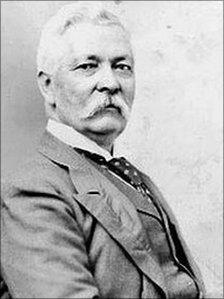More than 50 prominent names oppose Stanley statue
- Published

Stanley became famous for the words: "Dr Livingstone, I presume?"
More than 50 academics, authors, and other prominent figures have signed a letter opposing a statue of the explorer HM Stanley in his home town.
They believe Stanley, from Denbigh, was guilty of crimes against humanity, aiding colonisation and slavery.
The letter, published in the Daily Telegraph, suggests a permanent exhibition could give a "fuller historical context".
Denbighshire council said there had been local support for a sculpture.
The £31,000 bronze sculpture has already been commissioned, funded by Denbighshire council, Denbigh and St Asaph town councils, and others.
However, Bangor university lecturer Selwyn Williams has been collecting signatures, with others, from those opposed to the idea of a statue.
Mr Williams claims Henry Morton Stanley was guilty of crimes against humanity.
The letter states: "We call on the people of Denbigh not to erect any statue to 'honour' the imperialist HM Stanley.
"A statue would convey uncritical approval and celebration of all aspects of Stanley - something not possible for such a controversial figure today.
"It is wrong to romanticise the African "adventures" of Victorian era imperialists.
"The racist ideas of the day led to hundreds of thousands of Africans being killed or mistreated - Europeans believing that their supremacy entitled them to confiscate land and exploit natives and resources."
Signatories so far include author Jan Morris, writer and poet Benjamin Zephaniah and lecturers across the globe.
One of them, Georges Nzongola-Ntalaja, professor of African studies at the University of North Carolina, USA, said in an e-mail: "I would like to add my name to the list of people supporting your petition to stop the city of Denbigh's plan to erect a statue of Henry Morton Stanley, who committed heinous crimes against humanity in my homeland, the Congo."
Mr Williams said: "The quality and range of signatories completely quashes any academic or historical case for the controversial statue.
"We ask the people of Denbighshire and of Wales to make sure that it is never erected.
"The resources should instead be used to provide an educationally valuable interpretive centre where a balanced view of Stanley's involvement in Africa could be presented."
Denbighshire council said it appreciated different views, but it had circulated a questionnaire during a consultation which it said received an "extremely positive response".
It added: "The results confirmed that the local residents wanted to see a commemoration to HM Stanley in both Denbigh and St Asaph."
- Published20 July 2010